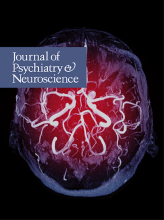A 47-year-old man with a long history of alcohol dependence and impaired control over intake has refused all the approaches suggested to him (e.g., detoxification followed by residential treatment, Alcoholics Anonymous, cognitive–behavioural therapy). He maintains a reasonable psychosocial adjustment (i.e., family relations, work, leisure), and physical damage (neurological, cardiovascular, liver functions) is still minimal. What can his family physician offer him?
Among the emotional and psychological problems treated by primary care physicians, alcoholism is one of the most frequent. However, little of the accumulated knowledge in alcoholism research over the past 20 years has percolated to clinical practice. Psychopharmacological agents in alcohol abuse treatment are largely ignored. At least 3 reasons are easy to identify:
Alcohol dependence, when not too severe, is not perceived as an addiction and is not put on the same footing as addictions to illicit substances.
Craving for alcohol is not linked with the long-term alterations in neuronal activity of neurotransmitter systems that alcohol abuse induces.
Their effects on treatment retention and drinking outcomes are significant but modest. The placebo groups in the clinical trials show usually so much improvement (Malec E, et al. Buspirone in the treatment of alcohol dependence: a placebo-controlled trial. Alcohol Clin Exp Res 1996;20:307–12; Kranzler HR. Pharmacotherapy of alcoholism: gaps in knowledge and opportunities for research. Alcohol Alcohol 2000;35:537–47) that large samples are necessary to demonstrate the superiority of the active medication. What does it mean? That the most important factor in the control group resides in the patient motivation (belief, expectation, readiness to change) and in the therapist’s skill in enhancing motivation.
The good news concerning the psychotherapeutic approach in alcoholism is that current evidence shows that a brief intervention, easy to learn by nonspecialists, is among the most efficacious and not inferior to more intensive and more costly approaches. Severe cases, as well as less severe ones, can be handled in that way (Miller WR, Rollnick S. Motivational interviewing. 2nd ed. New York: Guilford Press; 2002). Treatment consists of detailed assessment, feedback, an empathic and nonconfrontational approach and systematic resolution of ambivalence.
Among the pharmacological adjuvants that can facilitate such brief interventions are opioid antagonists (naltrexone [50 mg/d], approved by the US FDA in 1994, and acamprosate [1.3–2 g/d], in use in Europe for 14 years and currently under review by the FDA). They interfere with the brain neurotransmitter systems that produce the rewarding effects of alcohol and have been shown to contribute significantly to prolong abstinence. Craving scores fall significantly within a few weeks. These antidipsotropic medications are low risk. Lengths of trials have extended to 1 year or more. Reported side effects for naltrexone are nausea, headaches, dizziness and arthralgia; renal insufficiency is the only known contraindication of acamprosate.
Other psychopharmacological agents, such as buspirone or bromocriptine, contribute to the improvement of alcohol-induced psychopathology (anxiety, depression, aggressiveness), but have no demonstrated effect on craving and relapse prevention.
The family physician’s current best choice is to learn the motivational interviewing principles and techniques, combined or not with anticraving medication.
Footnotes
To submit questions for this regular feature, please send them to the Journal of Psychiatry & Neuroscience / Revue de psychiatrie & de neuroscience, Canadian Medical Association, 1867 Alta Vista Dr., Ottawa ON K1G 3Y6, Canada; fax 613 729-9545; jpn.office{at}sympatico.ca. Please include details of any relevant case and your name, address, telephone and fax numbers as well as your email address.
The information in this column is not intended as a definitive treatment strategy but as a suggested approach for clinicians treating patients with similar histories. Individual cases may vary and should be evaluated carefully before treatment is provided.
Competing interests: None declared.






